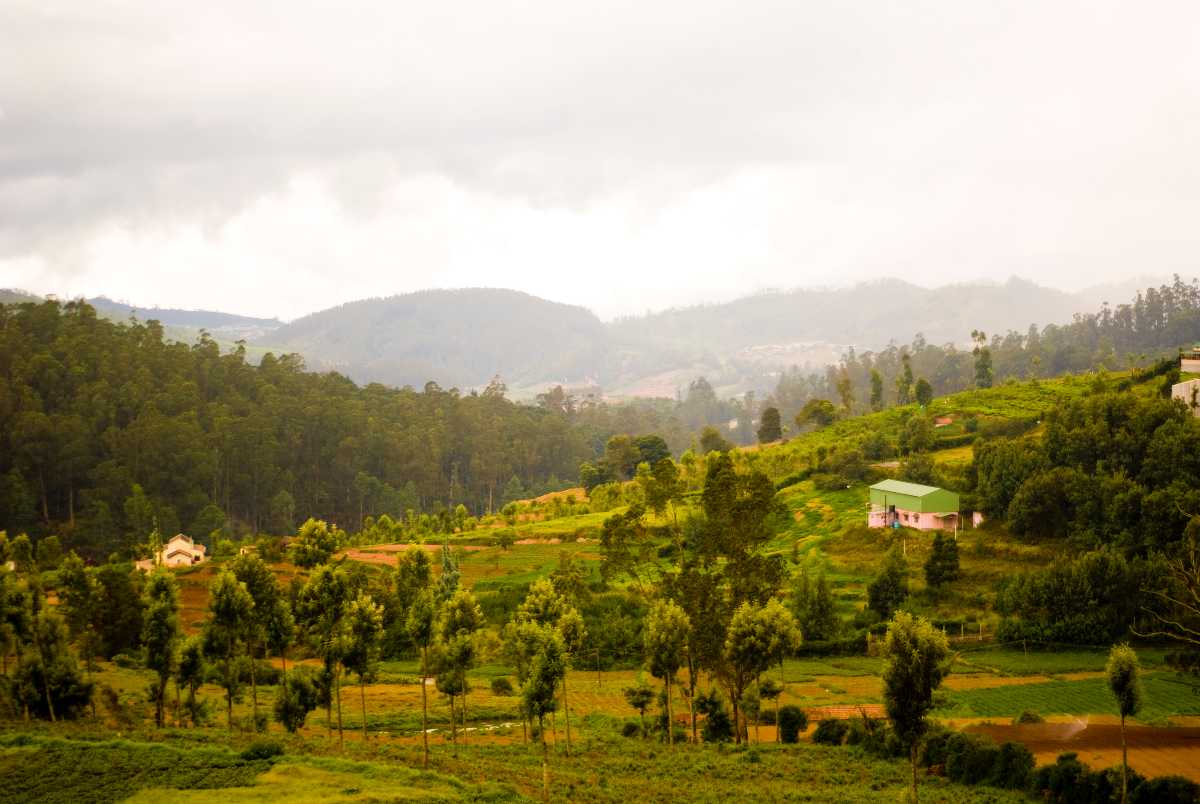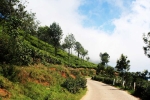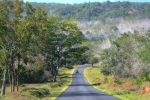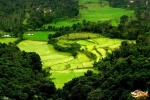Mudumalai National Park Tourism
Beaches, Hills Valleys, National Parks,
Ideal Duration : 1 day
Best Time : December to June
"An exotic side of India's Fauna"
Mudumalai National Park Tourism
Mudumalai National Park is a part of the Mudumalai Wildlife Sanctuary, located at a distance of 150 kilometres from Coimbatore, in the Nilgiri District of Tamilnadu. It connects the Western Ghats to the Eastern Ghats and owes its popularity to the fact that it?s home to many vulnerable and endangered animal and bird species. The neighbouring states of Kerala and Karnataka both have their borders adjacent to the park. The Ooty-Mysore highway passes through the forest, curving around the Moyar river which separates Mudumalai and the Bandipur National Park.
Mudumalai is presently being considered for declaration as a world heritage site by UNESCO. The 6,000 square kilometre area under consideration comprises of the Western Ghats in Nilgiri, encompassing all of Mudumalai National Park.
Mudumalai is best known for its beautiful landscape of the blue skies complimenting the Nilgiri Hills owning the similar tint and surrounding hills and the Mudumalai National Park, which houses many species of animals and birds. The city has a wide variety of impressive and unique animals. There is an exotic aspect to the nature of Mudumalai given that it is the habitat for some of the most unique and rare fauna found in India The grey langur and bonnet macaque are two primates of the area. Tigers, leopards, dholes, golden jackals, etc. can also be sighted. Bird watching is an interesting activity here as fine bird specimens flock this area quite often.
Download Mudumalai National Park PDF Guide >
What's Great?
The climate is pleasant throughout the year. Excellent road connectivity.
What's not so Great?
The cuisine is predominantly South Indian with limited eateries. Bull elephants are a problem in the area (be alert at all times).
For Whom
Mudumalai is an ideal destination and one of the popular sightseeing places to enjoy the vacation with family. It is a haven for wildlife photographers and can be visited by nature lovers and bird lovers.
Entry Fee
Entrance fee is INR 15 per person
Mudumalai National Park
The entire park is divided into five ranges - Masinagudi, Thepakadu, Mudumalai, Kargudi and Nellakota.
Masinagudilies 7 kilometres from the core park area. The most popular tourist activity in this area is bird watching. It also offers the option for plantation visits as coffee, pepper, and tea plantations are part of this area. For an overnight stay, options are easily available in the form of lodges and resorts.
Thepakaduforms the entrance to the park and this is where jeeps can be hired to explore the area. Elephant safaris are also booked at this very spot. Thepakadu is popular for its elephant camps where travellers can see the play of elephant calves and even play with the calves themselves.
Mudumalaiis the main park area where the majority of safari activities are concentrated. Lakes and some watering holes are found in this area. Many mammals and birds can be spotted here. Walking is strictly prohibited and even official vehicles are allowed to go inside up to a distance of 15 kms only.
Kargudiis the best spot for sighting the Indian leopard, along with other carnivores found in the park. It?s known for its natural beauty which is considered to be the most scenic in the entire park. A swamp is also part of this range, populated with elephants and bisons. Some dormitories can be found around this region for those looking for stay options.
Nellakotain the west is filled with dry deciduous forests, scrubs, and elephant grass. Fruit trees like jamun and figs grow here in plenty and Tigers, Indian Bisons, and elephants can be easily spotted.
Flora
Diverse and abundant flora thrives here. The terrain and vegetation significantly differ from one part of the forest to the other. Smooth grassland, swamps, valleys, nullahs, and flatlands are all part of the same terrain in the forest.
The eastern part of the sanctuary is scantily forested, but the central and western parts are thickly populated with varied forestation. Benne block in the west receives higher rainfall than other regions and is covered with tropical mixed and moist deciduous vegetation.
Bamboo, Mango, Java Plum (Jamun), Peepal, Banyan, Tamarind, Anogeissus latifolia (dhaora), Terminalia(saaj) and Grewia are commonly found here. Precious timber trees like Rosewood and Teak grow here in abundance. Flowering trees and plants like Jacaranda, Plumeria, and Solanaceae give the landscape a colourful touch.
Wildlife
Mudumalai has an abundance of diverse wildlife, with the highest density of tigers and the largest tiger population in the country. You can sight four wild cat species here, the Bengal Tiger, Leopard, Jungle Cat, and Leopard Cat. Indian wild dog (Dhole), Sloth Bear, Striped Hyena, and Golden Jackal are other carnivores found in the area. Several hundred elephants live in the area along with the Gray Langur and Bonnet Macaque. Herbivores are also aplenty here. Cheetal, Gaur (Indian Bison), Sambhar, Indian Muntjak, Wild Boar, and the Indian Spotted Chevrotain are common residents of the forest. You can also spot the Indian Giant Tree Squirrel and the Red Giant Flying Squirrel here. The most sighted reptile species here is the Monitor Lizard. Crocodile, Flying Lizard, Python, Spectacled Cobra, Asian Pit Viper, and Krait are also commonly found. Bird watchers are in for a treat as Mudumalai is home to a stunning 227 species of birds, 8 percent of all bird species found in India. Malabar Trogon and Malabar Gray Hornbill are endemic to the region. Eagles, Hornbills, Golden Orioles, Wagtails, Pompadour Green Pigeons, Fairy Bluebirds, Chloropsis, Alpine Swifts, Jungle fowls, Grey Francolins, Chestnut-headed Bee-eaters, Lesser Yellownapes, White-bellied Woodpeckers, Emerald Doves and Loten?s Sunbirds are some other commonly sighted species. It also provides a home to 50 fish species and 21 amphibian species.
Mudumalai Safari
This one is for all the Safari lovers. Unlike most other national parks, Mudumalai offers three types of wildlife safaris. Apart from the usual Van and Jeep safaris, it also offers elephant safaris.
There is no provision for booking and the system works on first come first serve basis. Van and elephant safaris are in high demand, and it is advisable to reach the safari office at least 30 minutes before the starting time. The safari office is in Thepakadu, at a distance of 10 km from Deep Jungle Home. The 10 km long stretch passes through the forest, making it a mini-safari before you go for the actual one.
Mudumalai National Park Safari Timings- The park is open all days of the week. Timings and fee depend on the type of safari. Private vehicles or taxis are not allowed inside the park.
Van Safari
The timing is 6:30 AM to 9:00 AM in mornings and 3:30 PM to 6:00 PM in evenings. The fee is INR 45 per person. It is free for children below the age of five. The duration of safari is 30 minutes per trip, and one van can accommodate 25 people.
Elephant Safari
Elephant safaris can carry up to four people at a time and cost INR 100 per person. The duration is same as a van safari. The timing is 07.00 AM to 08.30 AM in mornings and 03.30 PM to 05.00 PM in evenings.
Jeep Safari
Jeep safaris are organised by private drivers and therefore, timing, duration, and the fee all depend on the driver. Usually, the tour lasts for about an hour. The typical rate for a one hour trip is INR 1500.
Also, this safari does not go into the national park and circles the area around it. Chances of sighting animals are relatively low.
Itinerary
A 2-day trip is ideal to explore the beautiful surroundings and enjoy some leisure time at the resorts located in the area. Upon arrival in Coimbatore, day 1 can be spent sightseeing in Ooty and spending the night at a hotel/resort. Day 2 should be reserved for the safaris in the national park.
Restaurants and Local Food in Mudumalai National Park
Since this is a national park, you might not find elaborate or well laid out restaurants here and options tend to be somewhat limited, other than those attached to hotels, resorts and lodges. Hence, these tend to be the most convenient options and can provide you a decent variety. There will be small tea shacks in and around the area. It is advisable to carry your own snacks (chips, cake, etc.) or make personal arrangements for your trip here, to be on the safer side.
December - Juneis the best time to visit Mudumalai National Park
December to June are the best months to visit Mudumalai. Monsoons offer moderate rainfall while summers a greater chance to spot tigers.
Weather in Mudumalai National Park
Loading...
Mudumalai National Park in Summer (March - June)
The summer season in Mudumalai is moderately hot lasting from March to June. The temperature during this period ranges from a comfortable 20 to 37 degrees Celcius. A cool breeze blows in the evenings rendering the weather very pleasant and apt for sightseeing.
Mudumalai National Park in Monsoon (July - September)
The region experiences moderate rainfall lasting from July to September. The rain brings freshness to the area and rejuvenates the environment.
Mudumalai National Park in Winter (November - February)
The winter season is the ideal time to visit Mudumalai with the temperature ranging between 19 to 32 degrees Celcius. The place looks heavenly in the month of November right after being washed fresh with the monsoon showers.
Monthly Weather in Mudumalai National Park
Month
Avg. Minimum (°C)
Avg. Maximum (°C)
January
21
32
February
22
34
March
24
34
April
26
35
May
25
34
June
24
31
July
24
31
August
24
31
September
23
31
October
23
32
November
23
32
December
21
32
Comments on Mudumalai National Park
Post Your Comment


 The Jungle Safari
The Jungle Safari Madumalai National Park
Madumalai National Park Theppakadu Elephant Camp
Theppakadu Elephant Camp Ooty
Ooty Wayanad
Wayanad Coonoor
Coonoor Bandipur National Park
Bandipur National Park Coorg
Coorg Bellikkal
Bellikkal